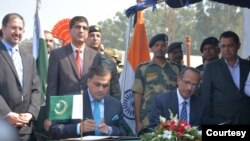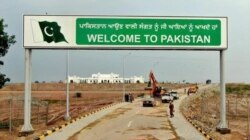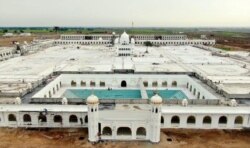Pakistan and India signed a landmark agreement Thursday on the opening of a new border crossing for Indian Sikh pilgrims to visit one of their holiest places in Pakistan.
The rare instance of cooperation between the two nuclear-armed South Asian rival nations comes amid a sharp deterioration in their traditionally strained ties.
The crossing will give visa-free access to pilgrims from India through a specially built corridor to the Pakistani town of Kartarpur, home to a temple, or gurdwara, believed to have been built on the site where the founder of Sikhism, Guru Nanak, died in the 16th century.
Senior Pakistani and Indian foreign ministry officials met at the Kartarpur border crossing Thursday and inked the “historic” agreement.
The head of the Pakistani delegation after the signing ceremony told reporters that as many as 5,000 Sikh pilgrims from India will be able to daily visit the temple.
“The agreement will facilitate pilgrims to visit (the temple) seven days a week from dawn to dusk. The Yatris (pilgrims) would come in the morning and go back in the evening,” Mohammad Faisal said.
He announced that Pakistani Prime Minister Imran Khan will formally inaugurate the corridor November 9, just days before the 550th anniversary of Guru Nanak’s birth.
The border crossing and corridor will replace a drawn-out visa process and drastically reduce a long journey through Pakistan for Sikh pilgrims to reach the temple, just around 4 kilometers from the border with India.
The minority Sikh community in India has long sought easier access to the temple because mutual tensions would often hamper the visa-seeking process. The corridor, however, will lead from the Indian border straight to the temple, with sides fenced off.
Pakistan has constructed a road and a bridge over the Ravi River and a fully equipped reception center in addition to constructing a huge complex around the shrine to host visiting Sikh pilgrims.
Faisal noted that the massive project has been completed in less than one year, making the temple “the biggest Sikh gurdwara” or worship place in the world. He said that Pakistan will charge a $20 fee to each visitor.
Thursday’s agreement comes as bilateral tensions have deteriorated since early August when India unilaterally revoked the special constitutional autonomy for the Muslim-majority disputed Kashmir territory.
Indian security forces simultaneously unleashed a security crackdown on dissent, arresting thousands of Kashmiris, including prominent local politicians. Internet and most telecommunications services remain suspended.
Pakistan denounced the Indian actions and immediately downgraded diplomatic ties with the neighboring country, fueling regional tensions.
Both countries administer a part of Kashmir, but both claim the region in its entirety and have fought two wars over it.






